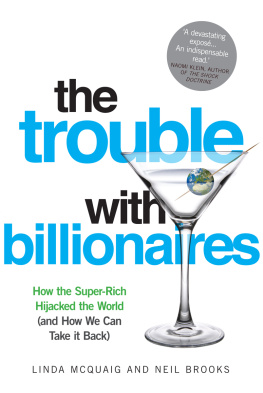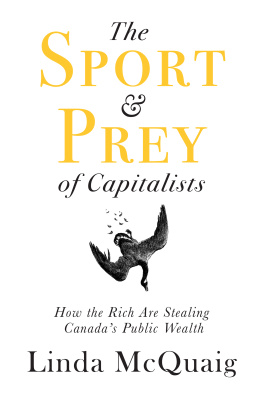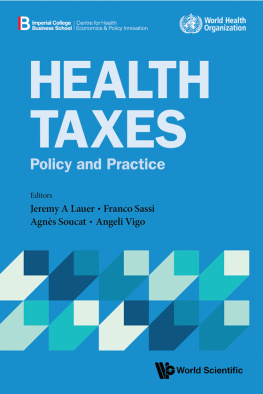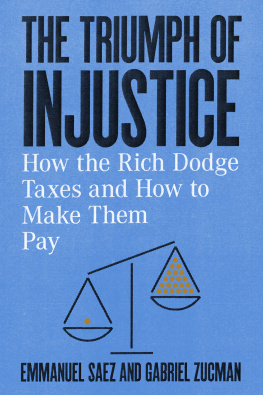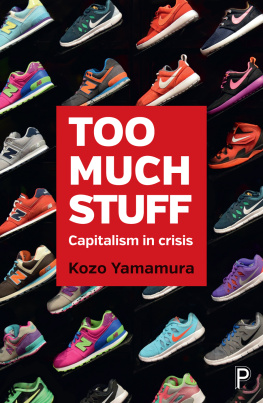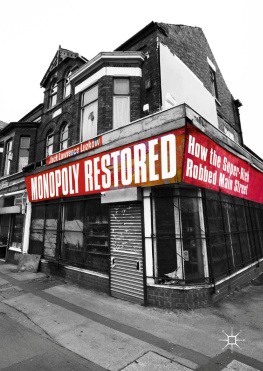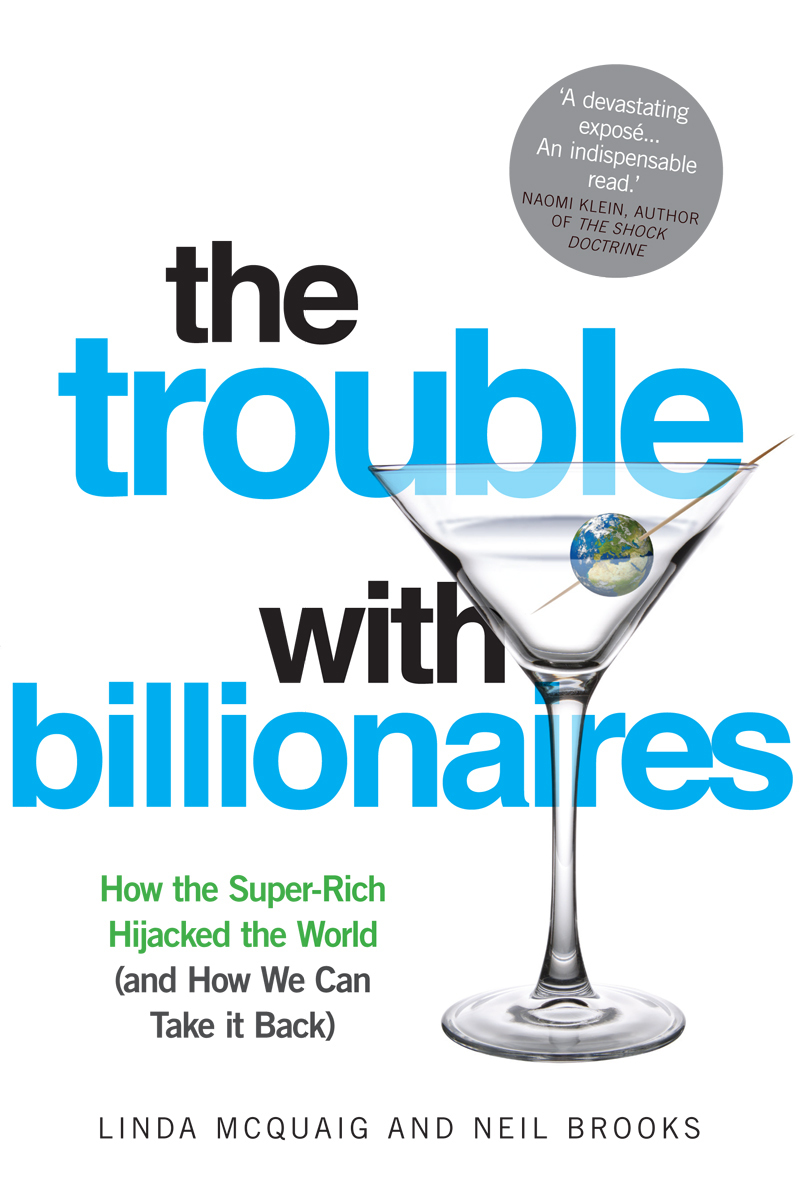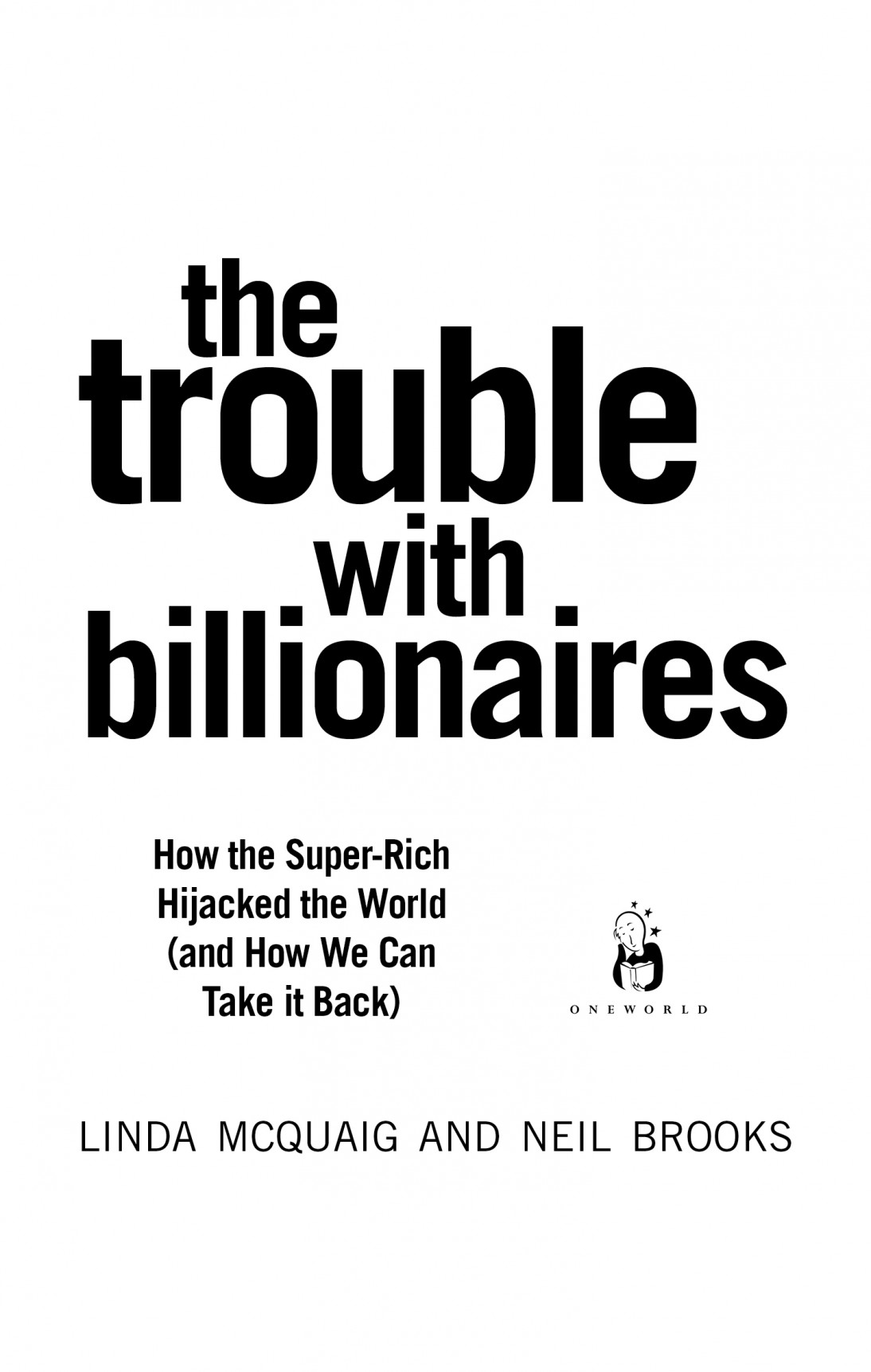L. M.
N. B.
Few tricks of the unsophisticated intellect are more curious than the naive psychology of the business man, who ascribes his achievements to his own unaided efforts, in bland unconsciousness of a social order without whose continuous support and vigilant protection he would be as a lamb bleating in the desert.
R.H. TAWNEY
The disposition to admire, and almost to worship, the rich and the powerful, and to despise, or, at least, to neglect persons of poor and mean conditionisthe great and most universal cause of the corruption of our moral sentiments.
ADAM SMITH
Contents
1
Return of the Plutocrats
Imagine this: you are paid a pound every second.
After one minute, you would have 60. After one hour, you would have 3,600. If this spectacular rate of pay continued day and night, it would take twelve days for you to become a millionaire something beyond most peoples wildest dreams.
But how long would it take to become a billionaire?
Well, at that rate, it would take almost thirty-two years.
This little game helps illustrate that being a billionaire isnt just beyond most peoples wildest dreams; its likely beyond their comprehension. It also highlights how odd it is for society to regard the accumulation and retention of such vast material wealth by one individual as an appropriate aspiration.
Heres another thought experiment that illustrates how far beyond our regular comprehension the size of a billionaires fortune is: imagine how long it would take Bill Gates, typically considered the worlds richest man, to count his $53 billion. If he counted it at the rate of one dollar every second, and he counted non-stop day and night, hed have it all tallied up in 1680 years. Still another way to look at it: if Bill Gates had started counting his fortune at that rate back in 330 ce the year that the Roman emperor Constantine had his wife boiled alive and chose Byzantium as the empires new capital hed just be finishing up now.
The fortunes of the wealthy, as revealed in the 2012 Sunday Times Rich List, are more opulent than ever before in history. Having recovered from the minor bruising they took in the 2008 financial collapse which some in the City directly helped bring about the rich now tower over the nation as financial behemoths. The combined wealth of the 1000 on the list totals 414 billion an amount greater than a third of the UK gross domestic product (GDP), and higher even than their previous combined record of 412.8 billion, set just before the crash. Despite this cornucopia, Prime Minister David Cameron announced plans in early 2012 to send more their way by cutting the top marginal tax rate by 5 percentage points. This provided an average saving of 14,000 a week an extra treat that was probably barely noticed by many in the far upper reaches of the 1 per cent.
Meanwhile, for the masses there would be no such mollycoddling, but rather a stiff dose of austerity, cutting deeply into health care services, education and welfare. With unemployment pushing three million, including one million young people, and incomes generally stagnant or falling, those in government were fierce in their resolve not to scrimp on austerity. So while the rich were indulged, despite their role in bringing about the financial collapse, the burden of dealing with the resulting recession and debt was shunted on to millions of ordinary Britons, who played no role whatsoever in bringing about the financial disaster. Its a replay of the brutal austerity medicine applied in Britain after the First World War a disastrous era that bears striking similarities to today, and to which well return in Chapter Eight.
Theres growing evidence that the current austerity, even apart from issues of fairness and justice, simply isnt working as an economic cure. Indeed, the IMF, an institution with a long record of imposing austerity on debtor nations seeking aid, forcefully condemned the austerity mania that has gripped Europe. In a lengthy report in October 2012, the IMF pointed out that austerity can be self-defeating, causing sharp contractions in an economy. It noted that Britains austerity plans will likely suck 76 billion more out of the economy than expected by 2015, and move the UK from the camp of continental European countries, with their generous social welfare models, towards the stingy American model. Indeed, as the IMF data shows, the coalition governments austerity plans are projected to plunge Britains government spending below
The ultra-wealthy in the UK are part of a new global super-elite that is capturing an unprecedented share of the worlds resources. As a report by the charity Oxfam noted in January 2013, the 2012 income of the worlds richest one hundred billionaires totalled 150 billion enough to wipe out extreme So excessive is the hoarding of resources in a small number of hands that it is hard not to gawk in disbelief. The Onion magazine astutely describes the gap between rich and poor as the Eighth Wonder of the World, and as a tremendous, millennia-old expanse that fills us with both wonder and humilitythe most colossal and enduring of mankinds creations.
The richpoor gap is indeed a millennia-old project. But its worth mentioning that there was once a blip. There was a brief period of about four decades when a small dent was made in the edifice of the richpoor gap in the Western world a small dent that made a significant difference to millions of people. What makes that brief interlude particularly significant is that it happened quite recently, from roughly 1940 to 1980, and that it coincided with an era of almost unprecedented prosperity and economic growth.
By any logic that brief interlude should have sparked serious inquiry into just how it happened. Instead, theres been an almost deliberate avoidance of the subject in official circles, an unwillingness to probe the cause of the dent in the richpoor gap, how it coincided with such robust prosperity, and how we might emulate it today. Like the memorable scene from the movie When Harry Met Sally , in which Meg Ryan dramatically fakes an orgasm in a restaurant, surely the appropriate response is the one from the woman at a nearby table: Ill have what shes having. Instead, our ruling elites have tried to wipe out the notion that the widely shared prosperity of the postwar years is something we should aspire to create again, advising us to forget what shes having and be content with the meagre bowl of gruel were being served.

